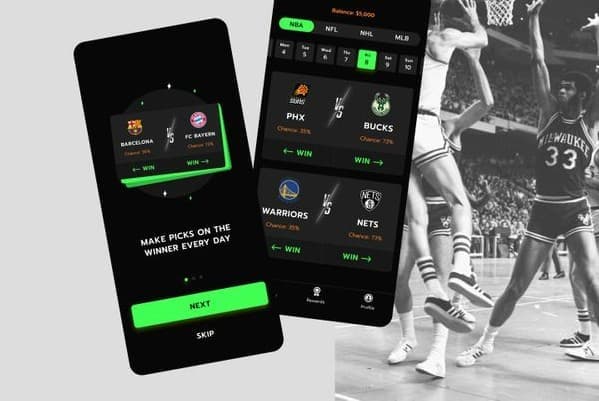In today’s digital age, the sports betting industry is experiencing a transformative shift, with mobile applications for bookmakers playing a pivotal role in this evolution. The development of mobile apps has not only revolutionized how bookmakers operate but also how users engage with sports betting. This article delves into the intricacies of developing mobile applications for bookmakers, highlighting the technological advancements, user experience considerations, and the regulatory landscape shaping this dynamic sector.
The Rise of Mobile Betting
The convenience of mobile devices has led to an unprecedented surge in mobile betting. Bettors now demand the ability to place wagers, track bets, and manage their accounts from anywhere, at any time. In response, bookmakers are increasingly investing in mobile app development to meet these user expectations and stay competitive in the crowded betting market.
Want to read something about NBA betting strategy? Then we recommend you this article: 10 Tips for Successful NBA Betting.
Key Considerations in Developing Mobile Apps for Bookmakers
- User Experience (UX): The success of a betting app heavily relies on its UX design. An intuitive, user-friendly interface that facilitates easy navigation, quick bet placement, and seamless account management is essential.
- Security and Privacy: With real money transactions and sensitive personal information involved, ensuring top-notch security and privacy measures is paramount. Implementing encryption protocols and secure payment gateways is non-negotiable.
- Compliance and Regulation: The betting industry is heavily regulated, with laws varying by jurisdiction. Mobile apps must adhere to these legal requirements, including age verification, responsible gambling policies, and anti-money laundering (AML) practices.
- Live Betting and Streaming: The ability to offer live betting options and stream sporting events directly within the app enhances user engagement and satisfaction, setting a platform apart from competitors.
- Cross-Platform Compatibility: Developing apps that offer a consistent experience across various devices and operating systems (iOS and Android) broadens the user base and accessibility.
Technological Advancements Driving Mobile App Development
The development of mobile applications for bookmakers is fueled by several technological advancements:
- Artificial Intelligence (AI) and Machine Learning (ML): AI and ML are being used to personalize user experiences, from recommending bets based on user history to providing real-time odds adjustments.
- Blockchain Technology: For enhancing security and transparency, some platforms are exploring blockchain technology to facilitate secure, verifiable transactions.
- Cloud Computing: Cloud solutions offer scalability and reliability for betting apps, ensuring they can handle high volumes of simultaneous users and transactions.
If you are interested in games and sports betting, then you will be interested in reading the BetBurger review. It is the best service for working with surebets and valuebets.
The Impact of Regulatory Changes
Regulatory changes significantly impact the development and operation of betting apps. As countries and states adopt or modify their gambling laws, mobile platforms must quickly adapt to ensure compliance. This dynamic regulatory environment requires bookmakers to be agile and informed, often necessitating regular updates to their mobile applications.
The Future of Mobile Betting

The future of mobile applications for bookmakers is promising, with several trends poised to shape the industry:
- Increased Personalization: Leveraging data analytics and AI, betting apps will offer more personalized betting experiences, tailored to individual user preferences and behaviors.
- Integration of Social Features: Social betting, including sharing bets, competing in leagues, and live chatting, is becoming increasingly popular, fostering a community atmosphere.
- Augmented Reality (AR) and Virtual Reality (VR): AR and VR technologies could revolutionize the live betting experience, offering immersive ways to engage with live sports events.
Challenges and Opportunities
While the opportunities in mobile betting are vast, challenges remain. Navigating the complex web of international regulations, enhancing cybersecurity measures, and continually improving the user experience are ongoing tasks for developers. However, those who successfully address these challenges are well-positioned to lead the market.
Conclusion
The development of mobile applications for bookmakers is at the forefront of the sports betting industry’s evolution. By focusing on user experience, embracing technological innovations, and adhering to regulatory requirements, bookmakers can deliver platforms that meet the modern bettor’s needs. As the industry continues to grow, the future of mobile betting looks bright, promising a more connected, engaging, and secure betting experience for users worldwide.
FAQs About Mobile Application Development for Bookmakers
How important is mobile app speed and performance for user retention?
- Speed and performance are critical for user retention. Slow loading times and poor app performance can lead to frustration and user churn.
Can mobile betting apps increase a bookmaker’s revenue?
- Yes, mobile apps can significantly increase a bookmaker’s revenue by expanding their user base, enhancing user engagement, and facilitating more frequent transactions.
How do bookmakers ensure their mobile apps are secure?
- Bookmakers implement various security measures, including SSL encryption, two-factor authentication, and regular security audits, to protect user data and transactions.
Are mobile betting apps legal everywhere?
- The legality of mobile betting apps varies by jurisdiction. Bookmakers must ensure their apps comply with local laws and regulations in each market they operate.
What’s the future of mobile betting apps?
- The future of mobile betting apps includes more personalized user experiences, integration of emerging technologies like AR and VR, and expanded social betting features, all within a secure and regulatory-compliant framework.